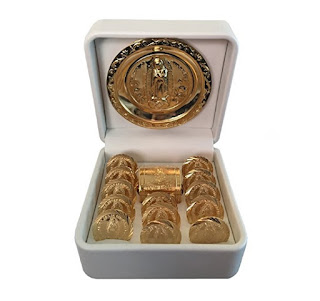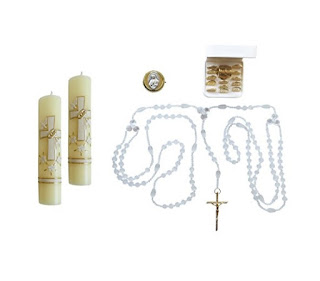Like every culture, wedding traditions in Mexico have
evolved over time with a blend of ancient customs from Mayan and Aztec rituals,
Spanish customs, as well as the incorporation of modern wedding trends. While
things like food, music, wedding dresses, and such elements of weddings vary
from one family to another in Mexican tradition, one thing that holds true −
the belief that marriage is a pillar of the family. With that said, for today’s
post we’ll look and four special wedding traditions popular in Mexico.
 |
| Wedding Arras |
Wedding arras – 13 gold coins
One unforgettable wedding tradition in Mexico is the
giving of 13 gold coins known as wedding arras. The roots of this tradition are
actually from a Roman tradition of breaking a silver or gold coin in two and giving
half to the bride and the other to the groom. This is to symbolize the finding of
middle ground in the marriage union.
 |
| Unique Mexican Wedding Kit |
Godparents serve as sponsors
Another special custom practiced in the Mexican
wedding tradition includes Godparents (Los
Padrinos) who serve as sponsors for different facets of the wedding including
things like flowers, the cake, and even the bride’s dress, plus they contribute
to the cost of the wedding ceremony. The role for the godmother (madrina) includes carrying a wine glass
for the toast, and other roles for godparents can involve a prayer book, guestbook,
an embroidered kneeling pillow, and a large loop of rosary beads known as the
wedding lasso which is used for another wedding tradition as the godparents place
it on the couple after they exchange vows.
What does the wedding lasso tradition mean?
The wedding lasso tradition represents unity. The
godparents place the lasso or lazo around
the necks of the couple in an eight-shape configuration which represents
infinity and symbolizes the love that binds the couple as they face the shared
responsibility of marriage together. It is laid upon the groom’s shoulders
fist, and then intertwined to join him to the bride. The lasso is then worn for
the remainder of the service, and once it is taken off is presented to the
bride as a keepsake that reminds her she has become the mistress of the groom’s
heart and home.
Variations of this tradition can include interlacing orange blossoms with the beads which is thought to represent fertility and happiness. In some families, a double wedding lasso is given by one set of the parents.
Delicious Mexican wedding cookies
One last Mexican wedding tradition worth mentioning
are Mexican
wedding cookies known as polvorones. The ingredients in these cookies are
very similar to Russian teacakes, or Italian wedding cookies and are made using
flour, butter, sugar and ground nuts. These cookies are also
known as Mexican wedding cake cookies but their origins date back to medieval
Arab according to food historians. No matter where they originated, they are a
special treat at any wedding.
Some links in this post are affiliate links.
We are a participant in the Amazon Services LLC Associates Program, an affiliate
advertising program designed to provide a means for us to earn fees by linking
to amazon.com and affiliate sites.
Thanks so much for being part of our success.


No comments:
Post a Comment